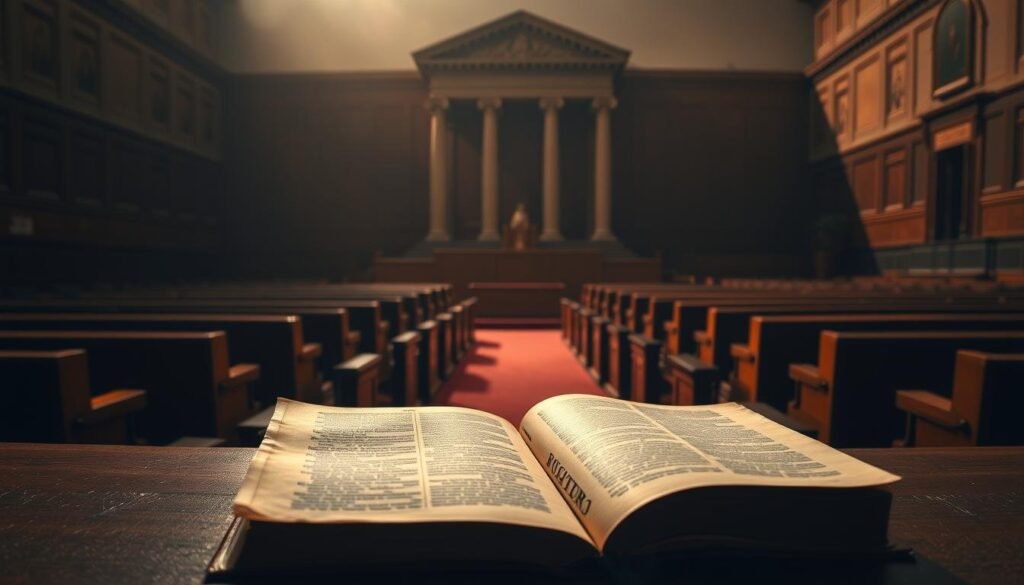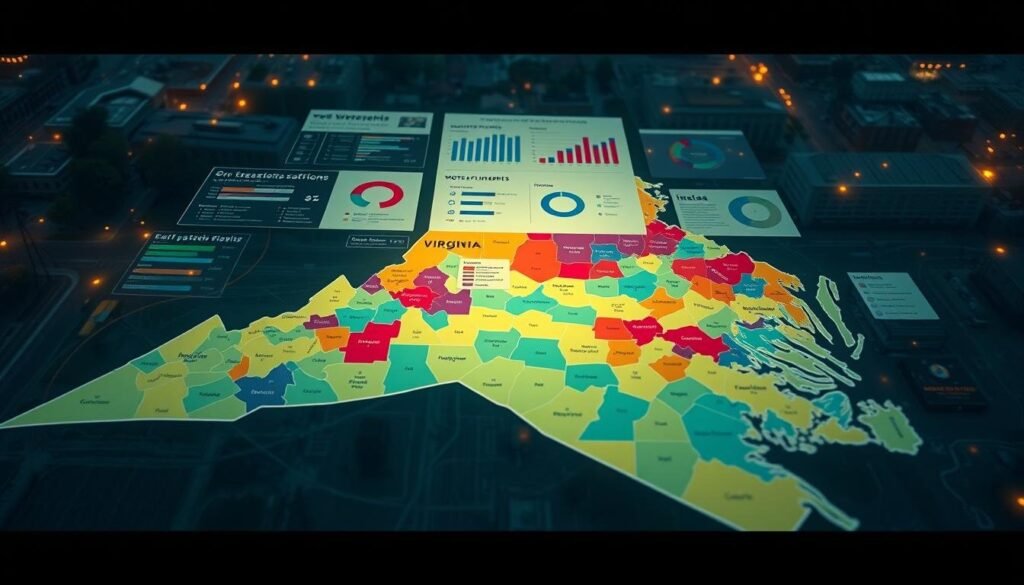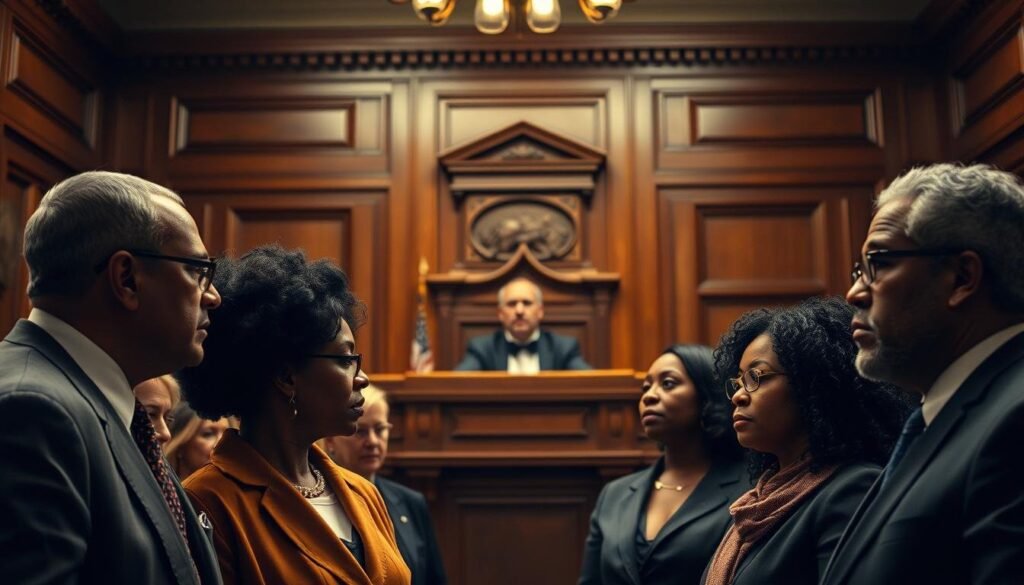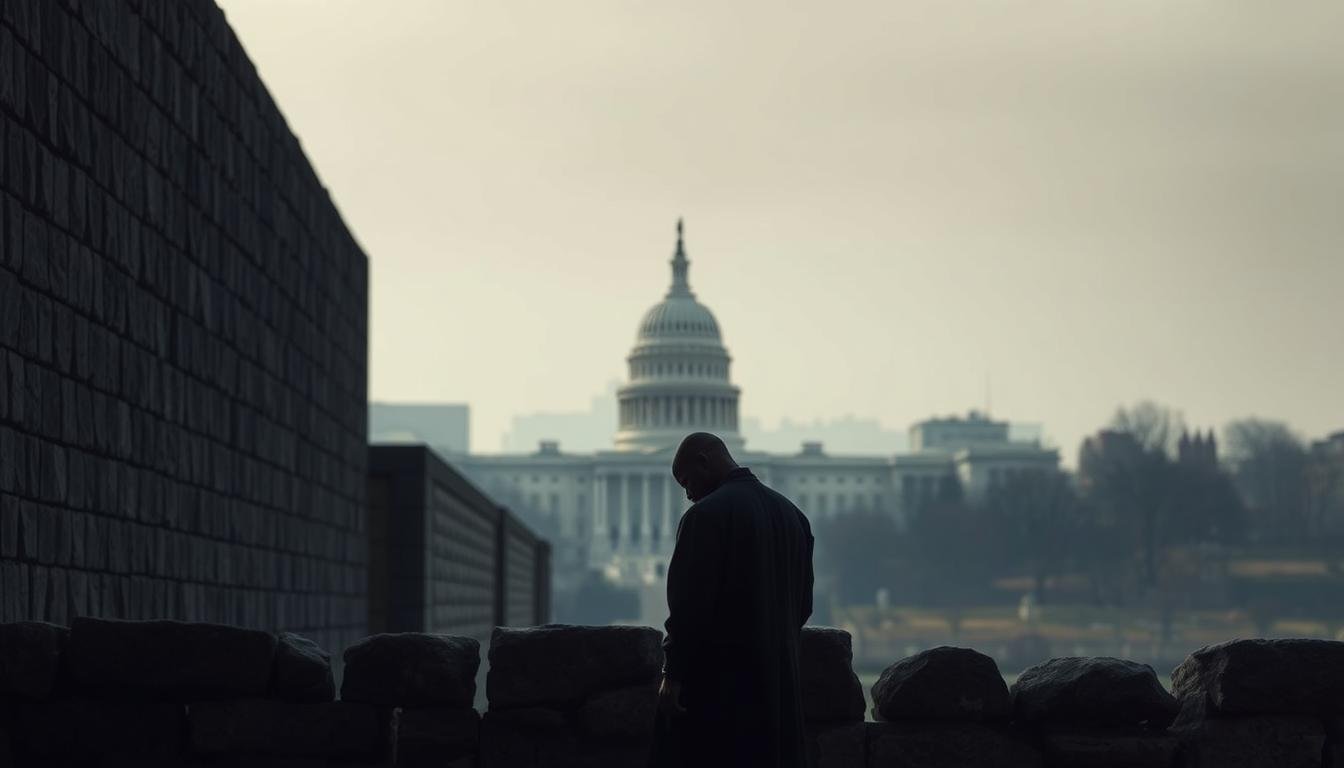Last updated on December 5th, 2025 at 07:17 am
Virginia Felon Voting Ban Lawsuit: You are about to explore a critical issue affecting many in the United States. A recent legal challenge questions a specific state law’s restrictions.
The Virginia felon voting ban lawsuit is key because it deals with felon disenfranchisement laws. These laws decide if people with felony convictions can vote. You might wonder how this lawsuit could change voting rights in the state.
As the case progresses, it challenges current restrictions. It aims to make clear the rights of those affected by these laws. Knowing about this lawsuit is important to understand possible changes in voting.
Contents
- 1 Understanding Virginia’s Felon Disenfranchisement Laws
- 2 The Virginia Felon Voting Ban Lawsuit: Key Details
- 3 Historical Context of Felon Disenfranchisement in Virginia
- 4 How Virginia’s Policy Compares to Other States
- 5 Impact on Virginia’s Voting Demographics
- 6 Arguments For and Against the Voting Ban
- 7 Potential Outcomes of the Virginia Felon Voting Ban Lawsuit
- 8 How to Determine Your Voting Eligibility in Virginia
- 9 Conclusion: Virginia Felon Voting Ban Lawsuit
- 10 FAQ
- 10.1 What is the Virginia Felon Voting Ban Lawsuit about?
- 10.2 How do Virginia’s felon disenfranchisement laws affect your voting rights?
- 10.3 What are the different models of felon voting rights restoration used by other states?
- 10.4 How can you determine your voting eligibility in Virginia?
- 10.5 What are the potential outcomes of the Virginia Felon Voting Ban Lawsuit?
- 10.6 What is the historical context of felon disenfranchisement in Virginia?
- 10.7 How do the arguments for and against the voting ban relate to your community?
- 10.8 What are the key details of the Virginia Felon Voting Ban Lawsuit?
Understanding Virginia’s Felon Disenfranchisement Laws
To know your voting rights in Virginia, you need to understand the felon disenfranchisement laws. These laws explain when people with felony convictions can or cannot vote.
Automatic Disenfranchisement Provisions
In Virginia, felon disenfranchisement happens automatically after conviction. This means your right to vote is taken away as soon as you’re convicted of a felony. You don’t need a special court order for this to happen. [Virginia Felon Voting Ban Lawsuit]
Duration of Voting Rights Suspension
How long your voting rights are suspended can vary. Virginia used to have a rule that felons could never vote again. But, recent changes and actions by governors have changed this.
Recent governors in Virginia have made important changes. They have helped restore voting rights to some people with felony convictions. These actions have greatly influenced the current laws.
How These Changes Affect Your Rights
The changes in Virginia’s laws and the governors’ actions mean your voting rights can change. It’s very important to stay informed about these changes. This way, you’ll know if you can vote or not.
To keep up with the latest on Virginia’s election laws and your voting rights, follow official announcements. Also, watch for updates on voting rights restoration.
The Virginia Felon Voting Ban Lawsuit: Key Details
Exploring the Virginia Felon Voting Ban Lawsuit reveals key players, legal arguments, and possible outcomes. This lawsuit challenges Virginia’s laws on felon voting rights.
Individual Stories Behind the Lawsuit
People with felony convictions are at the heart of this lawsuit. They’ve served their time but can’t vote because of old laws. Their stories show the real effects of these voting restrictions.
Legal groups like civil rights and voting rights organizations support the lawsuit. They see its importance and the chance to set a legal precedent.
Equal Protection Claims
The lawsuit argues that current laws break the equal protection rule. It says these laws unfairly target certain groups, violating their rights.
Racial Discrimination Arguments
Another argument is that these laws unfairly harm minority communities. Evidence shows the laws are not fair to everyone, especially minorities.
Key Court Dates and Decisions
The case is moving through the courts, with important hearings already. The decisions from these hearings will shape the case’s future. [Virginia Felon Voting Ban Lawsuit]
What to Watch for in Future Hearings
Future hearings will delve into the legal points made by both sides. Expect talks on the laws’ constitutionality and possible fixes if they’re deemed unfair.
The outcome of the Virginia Felon Voting Ban Lawsuit could have big effects on voting rights in Virginia and elsewhere. Keep an eye on this case as it unfolds.
Historical Context of Felon Disenfranchisement in Virginia
The history of felon disenfranchisement in Virginia is complex. It goes back to the post-Civil War era. To understand today’s laws, we must look at their history and how they’ve changed over time.
Post-Civil War Implementation
After the Civil War, Virginia, like many other states, passed laws that took voting rights away from people with felony convictions. This was to limit the voting power of African Americans, who had just gained freedom. The Virginia legislature made these laws to keep control and power.

Studies show that these laws hurt minority communities more. In Virginia, African Americans are much more likely to lose their right to vote because of felony convictions. This disparity shows the lasting effects of old discriminatory practices.
Key Legislative Changes Through the Decades
Over the years, Virginia has made important changes to its laws on felon disenfranchisement. In the late 20th century, some laws were changed to make it easier for people with felony convictions to vote. But, the process is still complex, and many can’t vote. It’s important to understand these changes to know the current laws.
The historical context is key to understanding Virginia’s felon disenfranchisement laws today. It’s vital to consider this background when looking at the ongoing lawsuit and its possible outcomes.
How Virginia’s Policy Compares to Other States
Looking at Virginia’s laws on felon voting rights shows a wide range of policies across states. Each state has its own way of handling voting rights for people with felony convictions.
Automatic Restoration Models
Some states automatically give back voting rights after a set time or when a sentence is finished. For example, Maine and Vermont let people with felony convictions vote even if they’re in jail.
Never-Lose-Rights Models
Other states have stricter rules. For instance, Kentucky and Virginia make it hard to get voting rights back. It takes a long time and can be very complicated. [Virginia Felon Voting Ban Lawsuit]
Recent Reform Movements Across the Country
There’s a big push to change laws about felon voting rights in the U.S. Many states have passed new laws to help people with felony convictions vote. For example, Florida let over 1.4 million people with felony convictions vote in 2018.
| State | Policy | Restoration Process |
|---|---|---|
| Maine | Never-Lose-Rights | No restoration process needed |
| Vermont | Never-Lose-Rights | No restoration process needed |
| Virginia | Restoration after sentence completion | Complex restoration process |
| Florida | Restoration after sentence completion (reformed in 2018) | Simplified restoration process post-referendum |
The rules on felon voting rights are very different in each state. Knowing these differences helps us understand the big picture of voting rights restoration.
Impact on Virginia’s Voting Demographics
Felon disenfranchisement laws in Virginia have big effects on voting and community life. These laws change how different areas and groups vote in the state. [Virginia Felon Voting Ban Lawsuit]
Statistical Breakdown by Region
Virginia’s areas vary a lot. They differ in population, money status, and crime rates. These differences affect who can vote. Here’s a table showing how many felons can’t vote in different places.
| Region | Felon Disenfranchisement Rate (%) | Total Population |
|---|---|---|
| Northern Virginia | 2.5 | 2,500,000 |
| Richmond Metro | 3.8 | 1,300,000 |
| Hampton Roads | 4.2 | 1,800,000 |
How These Disparities Might Affect Your Community
These differences in who can vote can really change local elections. They can also affect who represents your community in government.

If these laws change, voting in Virginia could look very different. It’s important to understand these changes to see how they affect everyone.
Key considerations include:
- The potential for more people to vote in affected communities.
- How changes in voting could affect election results.
- The impact on who gets to make decisions in your area.
Looking at these points helps us see how laws about voting affect Virginia’s communities. [Virginia Felon Voting Ban Lawsuit]
Arguments For and Against the Voting Ban
The Virginia felon voting ban lawsuit has sparked a heated debate. People are arguing about public safety, civic responsibility, traditional values, rehabilitation, and democratic representation. Each side has strong points to make.
Public Safety and Civic Responsibility Claims
Those who support the ban say it keeps communities safe. They believe that people who have committed serious crimes don’t deserve to vote. They think these individuals have shown they don’t respect the law.
They argue that committing a felony shows someone can’t be trusted to make good decisions for their community.
Traditional Values Perspectives
Some people see the ban as a way to protect traditional values. They think certain crimes are so bad that they should lose the right to vote. They believe in keeping the moral standards of society intact.
Rehabilitation and Reintegration Arguments
Opponents of the ban say it hinders rehabilitation and reintegration. They believe that after serving their time, people should get to vote. They see voting as a key part of becoming a part of society again.
They think giving people the right to vote helps them reconnect with their community.
Democratic Representation Concerns
Another concern is that the ban could affect democratic representation. It might keep some groups from having a say in government. This could lead to an imbalance in representation.
Polling Data from Virginia Residents
Recent polls in Virginia show mixed opinions. Some people support the ban, while others think it’s unfair. They believe that once someone has served their time, they should have the right to vote.

The lawsuit has shed light on the complex issues at play. As it moves forward, it’s important to weigh all the arguments. The outcome could have a big impact on Virginia’s voting landscape.
Potential Outcomes of the Virginia Felon Voting Ban Lawsuit
The Virginia Felon Voting Ban Lawsuit is ongoing. Its outcome could change how you vote. The court’s decision might alter Virginia’s voting laws a lot.
Potential Outcomes:
- Full invalidation of the current voting ban
- Partial reform of the existing law
- Introduction of new laws or amendments
Full Invalidation Scenario
If the lawsuit wins, you and many others might vote again right away. This means people with felony convictions won’t be kept from voting.
Partial Reform Scenario
A partial reform could mean some people with felony convictions can vote. But, you might have to meet certain conditions to vote.
Potential New Laws or Amendments
The lawsuit might lead to new laws or changes to the current ones. This could give you a chance to vote again. [Virginia Felon Voting Ban Lawsuit]
How Soon Your Rights Could Be Affected
When these changes happen depends on the court and lawmakers. You might see changes in your voting rights soon after the court decides.
How to Determine Your Voting Eligibility in Virginia
To see if you can vote in Virginia, check a few things. Your age, where you live, and if you’re a citizen matter. These are key to voting.
Online Resources and Verification Tools
Use the Virginia Department of Elections website to check if you can vote. They have a tool to see if you’re registered. [Virginia Felon Voting Ban Lawsuit]
If you want to check in person, visit your local county registrar’s office. They can help and give you the forms you need.
Step-by-Step Guide to Applying
To register to vote, you need to fill out a form. Here’s how:
- Get the voter registration form from the Virginia Department of Elections website.
- Fill it out with your name, address, and birthdate.
- Send the form to your local county registrar’s office.
Required Documentation and Waiting Periods
You’ll need to show who you are and where you live. A driver’s license or utility bill works. After you apply, there’s a wait before you can vote.
| Document Type | Purpose |
|---|---|
| Driver’s License | Proof of Identity |
| Utility Bill | Proof of Residency |
| Voter Registration Card | Confirmation of Registration |
Non-Profit Organizations Offering Help
Groups like the League of Women Voters can help with voter registration. They offer advice and resources.
Government Agencies to Contact
You can also reach out to the Virginia Department of Elections. They have info on voting and who can vote. [Virginia Felon Voting Ban Lawsuit]
By following these steps and using the resources available, you can find out if you can vote in Virginia. Then, you can make your voice heard.
Conclusion: Virginia Felon Voting Ban Lawsuit
The Virginia Felon Voting Ban Lawsuit has highlighted the complex issue of felon disenfranchisement. As the lawsuit moves forward, its outcome could greatly affect felon voting rights in Virginia.
It’s important to know that Virginia’s laws on felon voting have a long history. This history has shaped the state’s voting demographics. Comparing Virginia to other states shows different approaches to felon voting rights. This highlights the need for a detailed discussion.
The arguments for and against the ban show how complex this issue is. As the lawsuit reaches its possible outcomes, it’s key to think about how these might change voting eligibility in Virginia.
To keep up with your voting rights and the Virginia Felon Voting Ban Lawsuit, follow reliable sources. The future of felon voting rights in Virginia is uncertain. Understanding the lawsuit’s implications is crucial for everyone involved.
See Also: Can a Felon Be a School Bus Driver?
FAQ
What is the Virginia Felon Voting Ban Lawsuit about?
The lawsuit in Virginia is about voting rights for people with felony convictions. It says these laws unfairly target some groups and break equal protection rules.
How do Virginia’s felon disenfranchisement laws affect your voting rights?
In Virginia, people with felony convictions lose their right to vote. This loss doesn’t come back even after they’ve served their time or finished probation.
What are the different models of felon voting rights restoration used by other states?
Some states automatically give back voting rights after a set time or when a sentence is finished. Others never take away voting rights, no matter the conviction.
How can you determine your voting eligibility in Virginia?
To check if you can vote in Virginia, use online tools or contact your local registrar. Non-profit groups also offer help with voter registration.
What are the potential outcomes of the Virginia Felon Voting Ban Lawsuit?
The lawsuit could lead to big changes in Virginia’s voting laws. This might include making the current laws invalid, partial reforms, or new rules that affect your right to vote.
What is the historical context of felon disenfranchisement in Virginia?
Virginia’s laws on voting for felons started after the Civil War. Over time, these laws have changed, affecting who can vote in the state. [Virginia Felon Voting Ban Lawsuit]
How do the arguments for and against the voting ban relate to your community?
Debates over the voting ban touch on public safety, civic duty, and helping people get back into society. They also involve concerns about fair representation in elections, which impacts your community.
What are the key details of the Virginia Felon Voting Ban Lawsuit?
The lawsuit shares personal stories of those affected by the ban. It also highlights the support from legal groups and important court dates that will decide on voting rights in Virginia.

Van Maldonado, born in California, holds a degree in Criminology and Police Science. Currently serving as an investigative officer at a local police station, he spends his leisure time writing insightful content for FelonScope.com.

